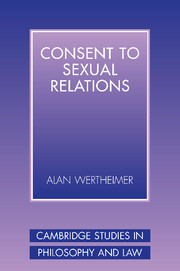Book contents
- Frontmatter
- Contents
- Preface
- Acknowledgments
- Abbreviations
- 1 Introduction
- 2 Law
- 3 The psychology of sex
- 4 The psychology of perpetrators
- 5 The harm and wrong of rape
- 6 The value of consent
- 7 The ontology of consent
- 8 Coercion
- 9 Deception
- 10 Competence
- 11 Intoxication
- 12 Sex and justice
- Appendix: Alphabetical list of hypothetical cases
- Index
7 - The ontology of consent
Published online by Cambridge University Press: 04 March 2010
- Frontmatter
- Contents
- Preface
- Acknowledgments
- Abbreviations
- 1 Introduction
- 2 Law
- 3 The psychology of sex
- 4 The psychology of perpetrators
- 5 The harm and wrong of rape
- 6 The value of consent
- 7 The ontology of consent
- 8 Coercion
- 9 Deception
- 10 Competence
- 11 Intoxication
- 12 Sex and justice
- Appendix: Alphabetical list of hypothetical cases
- Index
Summary
Consensual minimalism states that, ceteris paribus, sexual relations are morally and legally permissible if and only if both parties give consent that is consistent with the moral and legal versions of PVC. Although the important issues concern the conditions of validity, we need to ask what consenting amounts to in the first place – valid or invalid. In this chapter, I ask: what sort of phenomenon is the consent that can be morally transformative in the relevant way? In the next four chapters, I consider issues of validity.
Ontology of consent
Roughly speaking, there are three accounts of what we might pretentiously call the ontology of consent. A subjective view argues that consent is a psychological phenomenon, that B consents if and only if she has the relevant mental state. A performative view argues that consent is behavioral, that B consents if and only if she tokens or expresses consent in an appropriate way. A hybrid view maintains that the relevant mental state and relevant consent token are both necessary for morally transformative consent.
Some courts, statutes, and legal treatises appear to adopt the subjective view. Others adopt the performative view, as in a recent Canadian case:
Consent for purposes of sexual assault is found in the communication by a person with the requisite capacity by verbal or non-verbal behaviour to another of permission to perform the sexual act. The actual thought pattern in the mind of the complainant cannot be the focus of an inquiry into consent in a sexual assault trial.
- Type
- Chapter
- Information
- Consent to Sexual Relations , pp. 144 - 162Publisher: Cambridge University PressPrint publication year: 2003
- 1
- Cited by



